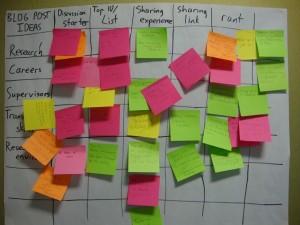I used to do a fortnightly round-up of things that I had been sharing or things that I had seen whilst on my travels, and then I stopped doing that. I think it would be a mistake (for now at least) to promise to do that regularly again, so instead I’ll start this irregular series of posts: Interesting Things. The condition for sharing things in these posts is that the thing I’m sharing interests me (or it’s something I’m doing, because I like talking about myself sometimes!).
Tag: creative thinking
Funding the Podcast
Last year I had what I thought was a bright idea: I would create a Patreon campaign to support the production of the Viva Survivors Podcast. An ongoing patronage programme where people who wanted to fund the creation of a resource sharing PhD and viva experiences could – completely opt-in and no barriers or paywalls in front of the episodes. That’s the very last thing that I want.
I had high hopes and then… nothing! No patrons, no enquiries, nothing. And then after a couple of months a piece of EU legislation around VAT and digital sales came in, and I had to take down the campaign anyway (it would put me in an incredibly difficult position to have to register for VAT, and the application of the rules to platforms like Patreon are not clear yet).
Back at square one? Not at all.
I’ve had a little time off from working on my second book on the viva (coming soon!), and this has given me some time to check through my records. I’ve been a skills trainer since September 2008, and have accumulated a lot of stuff – some of it is worth keeping and refreshing myself on – some of it I’ve been happy to chuck into the recycling bin in the last few weeks.
I recently found my notes from a workshop that I ran for Vitae a couple of years ago. The session was on blogging and social media, but the idea that jumped back to the forefront for me was the icebreaker for the day’s workshop, which we used as a way to get people thinking of ideas for blog posts. The process is called Heuristic Ideation Technique:

Workshop: Creativity for Researchers
I started writing about some of the courses I deliver on Monday. First up was How To Work With Your Supervisor. Today, I want to muse a little on Creativity for Researchers, which is a workshop I’ve been developing since 2010.
Creativity Post Round-Up
While I get to work putting my next book together, I thought it might be a good time to create a few posts summarising some of the regular series that I shared towards the end of 2014. I created a total of seven posts in my little series on creative thinking; I think that after my new book on the viva is finished I’ll return to sharing some more on creativity, it’s a topic I enjoy a lot!
There are lots of tools and tips and techniques for creativity. There are many helpful things that you can have in your environment and behaviours that could aid you. In these posts so far I’ve shared a few things that I find really helpful, and if you look online there are many posts like these. In today’s post, I want to share four sayings or quotes that have shaped how I think about creative thinking.
Sturgeon’s Law
“90% of everything is crud.” First coined by sci-fi author Theodore Sturgeon, this was used in specific response to criticisms of science fiction. You might think that this is a really unhelpful quote to keep in mind, but actually I find that it keeps me motivated: if 90% of everything is rubbish then one has to work hard to find innovative ideas. It sets a personal expectation for creative work. I don’t think it means that one has to reduce the number of ideas one has, and aim just try to have good ideas. Far from it actually…
Got a problem, situation or challenge that you need ideas for? Here’s a simple process for getting 20+ ideas that requires nothing more than two sheets of A4 paper (you can choose for yourself whether they’re lined or not).
Step 1
If you don’t already have a question for your situation, write down on one of the sheets a clear question about what you need ideas for. Read it aloud to make sure you’re happy with it. Put this to one side.
Step 2
Find the nearest book. Open it to a random page and point to a word on the left hand page. So long as this word is a verb, noun or adjective write it down on your second sheet of paper. (flip to a different page if you land on “the” “a” “her” or any other kind of preposition). Underline this word.
Step 3
Consider this randomly selected word and list beneath it as many associations as you can to this word. Take at least three minutes. If you start to slow down keep going. Push yourself!
Step 4
Bring back your first sheet with your question on. Use your list of associations, one-by-one, as inspiration for answers – ideas – to that question. As with Step 3, push yourself if you need to: thoughts may come quite quickly for some words and not for others. Your mind is a pattern-making system, and will try to fill in gaps. Don’t dismiss any idea.
From start to finish, this might take up to twenty minutes, and a reasonable expectation is to have twenty or more ideas by that point. Then the hard part begins: reviewing and selecting ideas that you want to take forwards!
Want to see an example?
In the last creative thinking post I was thinking about inspiration. I was writing about this in terms of things which either act as raw materials for novel ideas or things which support a creative environment. For the latter there was something which I clearly overlooked – obviously in hindsight – and that’s music. What’s your soundtrack for doing creative thinking or creative work?
Selections from the Ryder Playlist
I have a playlist to try to jumpstart my brain when I get to the office. Top of that is a piece from the 28 Days Later soundtrack called “In The House – In A Heartbeat” by John Murphy. I like how it starts quite slow and builds. It helps me, I think, to raise my thinking speed. By having the same piece when I start the day I also think it helps to focus me a bit (I recently read that people who have routine for the start of the days are productive? I wish I could remember where I read that). Maybe there is an element of personal belief in thinking that this works?
What Inspires You?

On my honeymoon, my wife and I were fortunate enough to visit MOMA and have a good morning of wandering around. It began with The Starry Night, which to my humble untrained eye is the most amazing piece of art ever. Whenever I look at it I feel refreshed, alive with possibilities: it gets my brain turning over, and gets me wondering… What if…?
There are lots of creative thinking processes and tools to aid idea generation (see my post on DRC, for example), but if these are the tools for the job, it’s still important to have raw materials. Inspiration – something that makes you go “Hmmmmmm…” – can come from lots of places. Where do you get your inspiration from? It comes from somewhere, so where is it?
Start
Just as every fortnight on a Monday I will be rounding up half a dozen articles or posts that I have found interesting, approximately every two weeks I’ll share a few quick creative thinking tips that I find useful. Today I’m focussing on a few simple ways to capture ideas.
Always carry something to write on: I’ve tried lots of things over the last ten years, from notebooks to Post Its, from napkins to phone apps, and all have had their advantages and disadvantages. I’ve settled on 5” by 3” record cards, plain white or ruled coloured depending on my mood (the former if I am just out to capture and doodle, the latter if I have something particular in mind). These cost around £2/£2.50 for a pack of 100 in stationery shops. They are great as they have just enough space to capture the outline of an idea. If you’re generating lots of ideas you can write each idea on a separate card. They are meant to be discrete things, but if you have lots of ideas relating to a project then you can later set them out on a surface to show how they connect – or you can put them in some kind of organised sequence.
